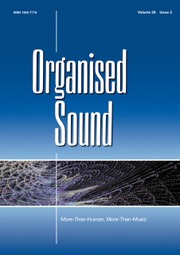Article contents
Sound and Musics in the Global Village: On landscapes in sound and soundscapes in culture
Published online by Cambridge University Press: 25 June 2008
Abstract
Following Marshall McLuhan's concept of a global village as a form of universal organisation in a technically dominated world, terms of globality and locality, and the concepts of world and village as social constructions in order to organise perception in an enhanced social environment are discussed in matters of their relevance in the context of electroacoustic music and especially its studies. In relation to historical as well as to more theoretical examples from the field of electroacoustic music, problems of perceiving spaces, places and locations are introduced. The solutions proposed here are primarily based on system theory approaches (as for instance Luhmann and Bühl) and newer network theory concepts (as for example Castells and Nowotny). The network is proposed as a kind of explanatory model in today's media-dominated world. Focusing on a model oriented to difference, ‘global’ and ‘local’ are regarded as categories guiding perception in matters of equality and difference. In this way the problem of listening to the other in opposition to the self is introduced. Thus it is demonstrated that there can never be a global sound or even a sounding globality. The phenomenon of soundscapes is discussed as a central theme in relation to its role as a listening strategy, its appearance in music and its own musicality.
- Type
- Research Article
- Information
- Copyright
- Copyright © Cambridge University Press 2008
- 1
- Cited by




